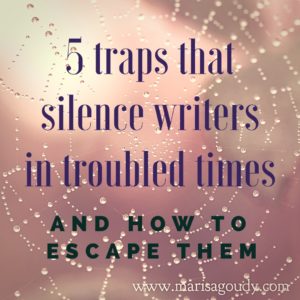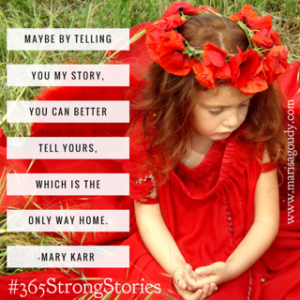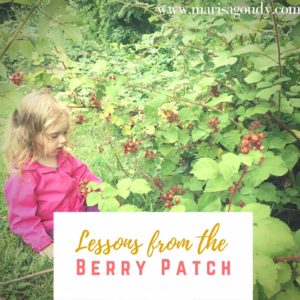
BLOG
So you want to write about politics (or whatever issue is troubling you & the world)
So you want to write about politics | Writing and Storytelling Coach Marisa Goudy
Right now, America is made up of two kinds of people. No, I don’t mean Democrats and Republicans.
As a citizen of the interwebs, you’ve made a choice: you’re either someone who posts about the election or you’ve decided to keep your personal and professional feed free of that political stuff.
Maybe you stay silent because just don’t really care about who ends up being president. If you’re in the transformation business , however, I bet that you care deeply about how America’s leadership affects the individual and the collective.
You either add to the conversation or watch from the sidelines based on your personal tolerance for controversy. And, you likely decide to speak up or shut up based on how you think publicly picking the blue team or the red will impact your professional online presence.
How is it working for you? Is it tough to stay quiet or are you regretting the last time you hit “share”?
But 2016 is different and the stakes seem higher (for real this time)
Oh, but wait a minute. You might be part of the third camp.
You might not be broadcasting the latest video from your preferred candidate’s campaign, but you might be taking a stand on hot topics from the latest rally.
In 2016, issues like sexual assault and the treatment of disabled citizens are shot with political nuance. Addressing them at all seems to say a lot about whether you lean left or right.
Suddenly, if you’re a therapist and you’re talking about something you’ve been trained to detect and heal, like the repressed memory of sexual trauma, it means you’re “getting political.” And while you may have a vast community of colleagues and allies who will support your statements - and share what you write - you also open yourself to a whole tide of partisan fervor that you just don’t have the bandwidth or the stomach to handle.
[tweetthis]As a healer, speaking up about the #election is about the personal, political & professional[/tweetthis]
But it’s not political, it’s personal
Just this week two clients - who both tell me they generally prefer to ignore all things political - have sent me pieces about Trump’s comments and how they opened past wounds and how the election is hurting their clients, especially the kids.
These women and I have built a great deal of trust. They sent me raw drafts that dove deep into the pain and the confusion that so many experience every time they look at the news.
This year, it's not political, it's personal. Writer and Storytelling coach Marisa Goudy
Clearly, they needed to explore this territory. And, because the issues were so timely and so painful, it wasn’t enough for these therapist-bloggers to keep these thoughts tucked away on a private page.
Let’s be clear: we all need to explore this territory. Divisions run terribly deep in the US these days, but at the end of it all, we all share a country. We need to do that with greater grace and decency after November 8.
All of us who dare talk about taking a “holistic approach” understand that when one of us bleeds, we all bleed.
Telling and sharing tough stories helps more people understand what that really means.
[tweetthis]We need to tell & share tough stories to show people what #holistic really means.[/tweetthis]
You needed to write it. Does that mean you have to publish it?
My first task as a writing and storytelling coach is to simply take in what’s being said and then reflect it back to the writer. Sometimes, that’s enough.
Typing it out and sharing it with a trusted audience of one may take the charge out of the idea so the writer can let it rest. It may also reveal that the topic is too intimate, unprocessed, and unhealed to go any further.
But, if the writer still feels like she has an enduring passion for the topic and trusts that the words come from "scars, not from gaping open wounds," we begin the editing process that leads to publication - somewhere.
To be sure about whether it’s worth taking the time to really untangle the ideas and perfect the rough draft, I ask a few questions:
Is this something that belongs on your blog? If your professional website’s main job is to attract parents seeking play therapy for their elementary school kids, a post about how adults can deal with old memories of assault that get triggered by watching CNN is going to be out of place.
Is this something that belongs on your Facebook wall or elsewhere on social media? If the post is relatively short and would require minimal editing, you might want to use the social media soapbox. After all, it seems like everyone else is, right?Just be prepared for anything… a longish post about a controversial topic could either go unnoticed or become a lightning rod for friends and trolls you never imagined would find you.
Is it something you want to see on HuffPo or another big site? The decision to seek publication depends on whether you have the time and whether it will help you reach other goals… Would you be able to leverage that new exposure into building your business or growing your community? Your website would need to be ready for the traffic and you’d need to greet them with a relevant email opt-in offer to make it a list builder.Keep in mind that time is not on your side when it comes to writing about issues that are making headlines right now.
Writing about the issues “everyone is talking about” is mostly about timing
Let’s dive into the question of timing for a moment. Ultimately, your decision to invest yourself in a piece of writing that relates to the shock of the moment is largely reliant on the clock.
The election season will end soon - thank goodness! The release of Trump’s Access Hollywood tape is now considered the turning point in the election, but the headlines have moved on to Wikileaks and talk of rigged elections.
This is what always happens. As devastated and incensed as people were about the death of a Syrian toddler, the Brock Turner case, the shooting of unarmed black men and police officers, the mainstream media and the majority of the population have moved on.
Like it or not, the collective attention was soon invested in the next outrage and, occasionally, the nice warm fuzzy (yes, little bird who landed on Bernie’s podium, I am looking at you.)
In the moment when these big stories take over, however, the multitudes are hungry for news, for fresh angles, for provocative opinions. But still, attention is a rare, fleeting commodity.
There’s such a narrow window of time to vie with so many other content producers - including many professional writers whose lives are built to accommodate staying up all night to be among the first to comment on the latest scandal.
Writing about the latest controversy is also about your "why"
Oh dear…
Have I negated everything I said about passion for a topic and the writer’s natural and healthy desire to explore an idea and be seen?
I don’t mean to. It’s just that I value your time and your precious writing gift so much that I want you to be sure you’re lavishing it on the topics and ideas that feed you - spiritually, creatively, philosophically, and professionally. And I want you to be aware of the trade offs.
I want you to be sure of why you’re writing the piece.
Do you need to say it publicly in order to sleep at night? Will raising your voice about this particular topic improve your bottom line or bring you some online visibility that helps you build a platform over time?
In that case, yes. Stay up late and turn those jagged paragraphs into powerful prose.
[tweetthis]Writing about the latest #election controversy is also about why you're in the transformation biz[/tweetthis]
The case for writing into your passions and daring to be heard
Robert Cox is a therapist, podcaster, and writer who sees the headline, feels the feelings, and starts writing. I got to know him and his writing through the Practice of Being Seen community. It was June when I had a chance to edit the first column he posted over at the Huffington Post, but his response to the Stamford rape trial still sticks with me.
And all of the brave work he’s done since, standing in his power as a trauma therapist and a dad who needs to speak his truth and address the toughest issues of the day continues to impress - and reach an increasing readership. When I decided to write about whether it’s worth writing about the election, I knew I needed to get his perspective:
Much of the reason I do it is grounded in my belief. I was inspired by Dietrich Bonhoeffer's "The Cost of Discipleship" written just prior to his going back to Nazi Germany - even though [American theologian and ethicist] Reinhold Niebuhr was begging him not to. Bonhoeffer’s point was that I cannot claim to follow Christ if I am not willing to risk everything.
So every time I start to think about the risk, how it might be seen by licensure boards, will it cost me professionally, blah, blah, blah....I hear his voice.
I think about what the world would be had it not been for men like him. Then writing seems small, but something I can do.
Remember who you are when you start to write about that next incendiary topic
You’re human.
That means the news is going to bum you out and piss you off. It’s going to make you want to hide under a rock and raise hell. It’s going to make you despair the state of the world.
You’re also a healer and a visionary. You’re able to take the news that broke your heart and, through the alchemy of your writing process, turn it into the golden insight that mends the hearts of your readers and clients.
Sit with your rage and your sorrow. Pour them into a selfish first draft that dwells on your pain and your personal reactions. Then, if you’re called to dive deeper and write further, ask yourself how you can move beyond exposing the madness and speak up for your values and also offer solutions.
We need bright white lights in the swirling mess of red and blue. If you’re feeling called to write and publish your response to the latest jaw dropping revelation, we need your shining voice to show us the way through.
Stop asking your writing to be original. Ask it to be meaningful.
What do I have to say about how to live a good life that hasn't been shared or said a million times before?
Jonathan Fields asks this question in the introduction to his brand new book How to Live a Good Life.
I know you've asked yourself the same thing. My clients wonder - and worry - about this all the time. I know I've wasted too much delicious writing time stressing about whether the world needs my words.
Truth is, whatever it is, it's almost definitely been said before.
You probably don't need proof on this one, but here it is. I had written most of this post before I picked up Jonathan's book and saw my own concerns reflected back at me. But, he wrote on and trusted his voice. Since that's what I invite people to do every day and since I do try to take my own advice, I'm publishing this anyway.
A loving reminder for you, the writer who is afraid to dive into a big topic because the luminaries in your field have already written brilliant books on the subject:
 WRITE IT ANYWAY
WRITE IT ANYWAY
The big names... they're fulfilling their mission to awaken and inspire the multitudes. The rest of us - the brilliant "not yet household names" and the beautiful "don't care to ever be household names" - right now, our mission is to make those messages REAL for people.
A reader may be ready to change everything thanks to Love Warrior, but all Glennon can do is inspire from afar. Daring Greatly may crack a vulnerable heart wide open, but Brene isn't a clinician, she's a researcher. Jonathan charges $1000/hour for consulting, and while I believe that's a completely worthy investment for certain people, there's a lot of vital, sustainable work to do at the $100/hour level too.
You're in the transformation business, not the originality business
The desire to transform, to be happy, to lead meaningful lives? These are timeless human needs. Wise people have been trying to crack the good life code and help others do the same from the very beginning. (Honestly, listen to Rob Bell's series about the Wisdom tradition and prepare to be amazed at how ideas presented in the ancient Hebrew feel utterly contemporary.)
Yes, all the truth tellers in the world of transformation, healing, and consciousness are essentially talking about similar things. That happens when people start discussing what's true and what's real.
As a healer, a therapist, or a coach it's part of your job to take the stuff "everybody" talks about and make theses truths your own. And, it's your job to help people own these truths.
You dive in and connect these big, ubiquitous concepts to your own stories. You bring the essence of who you are to the page. You don't speak to everyone, you speak to the ones who you wish to serve.
And then you put your work on your blog or in elsewhere in your marketing because you know people who are seeking and hurting need your perspective - and your help.
That's how you show your potential clients that you get it, that you get them. That's how you build a business and change your corner of the world.
It's not about being the first and only creature to share an idea. It's about speaking the right words in the right tone to the people who have access to you and your transformational magic.
It's about making meaning and building a connection with the people who matter.
Write it anyway. Write it now. Click the button for a printable PDF that will remind you to make it happen.
Your stories can heal and serve - but only if you're ready to tell them
These roads are like grooves in my unconscious mind. They’re direct routes into who I really am, but they exist just a few degrees beyond the coordinates of my everyday reality. My daughters and I are driving through my hometown, but I’m not sure they know where they are. They’re focused on seeing friends and the promised ice cream cones and eventually getting to “Neana’s bench.”
I don’t live here anymore. That’s nothing new, of course. I left Cape Cod when I was eighteen just like every other kid with the means and the desire knows to do. But my family doesn’t live in this town anymore either. Strangers dwell in the house where I grew up. All that’s left of our name in this town is etched into my mom’s memorial bench in the church garden.
When we cross into Barnstable, I stop worrying about the most direct path between point A and point B. I trust that I still know seven ways to get everywhere (essential knowledge when you grow up in a tourist town). Soon, I realize I am not choosing streets, I am navigating time.
The lane to my elementary school. Lindsay DiPesa’s old house. The soccer fields that used to be a farm. The rec center where I was a camp counselor. My ex-boyfriend’s parents’ historic home. (Curiously, I ended up passing that place twice, but then, I always ended up back in that relationship even when I tried to leave!)
Every residential area, every sand strewn road has a memory rolled into the pavement. There are hundreds of stories I could tell my girls. Instead, we listen to the radio station that served as the soundtrack to my childhood, and I say nothing.
I’m hoarding my stories. I don’t trust my voice and I don’t trust the tears that threaten every time I remember what the parents of thirty years ago looked like when they stood with their kids at the bus stop on fall mornings. I don’t have the energy to weave these reflections into something that matters to my kids.
If I point out the library, I would feel obligated to say how sad I am that the tree where my mom and I played Piglet and Pooh was cut down to make more parking. If I describe how we used to rent videos from that village store they’ll want to watch something on the iPad.
The good news: you get to choose what stories you tell. Choose the stories that nourish you and your audience.
My girls are still young. For now, I generally get to craft the container of their reality and control what influences their understanding of the world. The goal is to protect them, of course, but I also get to protect myself - especially when I’m lost in tender pockets of grief that are much too much for them to bear.
Telling them more about where mama played and worked and biked and learned might have added to their carseat experience, but it would have cost me too much.
Well-balanced stories heal, protect, and serve.
I talk a lot about the Story Triangle and how you need to balance the needs and interests of your audience with your own needs and interests all while keeping an eye on what makes a story meaningful and compelling.
The Story Triangle is your guide as you tell a story. It enables you to appeal to your audience and honor your authentic voice and make the narrative work. It can also help you decide whether you can tell the story at all.
In an attempt to be a “good” mom who gives the gift of my own history to my children, I could have seized the moment and played tour guide. After all, every kid loves to know what things were like for mom and dad so they can squeal at our primitive ways and also feel connected over all the things that feel just the same. The commentary about seaside suburban life in the 80s and 90s would have filled the whole drive.
But that would have pushed me further off balance than any mama should have to bear, however.
The Story Triangle would have been pushed off kilter and, because these things have real life consequences, when you’re a family in tight quarters, someone would have ended up in tears.
The same is true when you’re a writer telling a story meant to build online community and attract ideal clients. Telling a story that’s too intimate and exposes raw wounds doesn’t serve you or your ideal clients. You get a massive TMI hangover and your readers aren’t so sure you’re the person to help them heal.
The good news: my family still gets to go to the Cape frequently to visit my Dad and my stepmom, though it’s to a different town I’ll probably never really get to know.
I trust that next chapter of my story will be a cheerful one, and one that I’m able to tell with a strong voice. There will be many more chances to take that trip down all the lanes of memory when the girls are older and when my wounds are more fully healed.
There's something to be said for seizing the moment and telling a story when it's timely and fresh. But remember: the story, the audience, and you, the storyteller, are best served when you wait for the right healing moment.
The 5 Traps that Silence Writers In Troubled Times (And How to Escape Them)
 Every time I see a well-considered, from-the-heart blog post that seems to further a writer’s personal and professional mission, I’m impressed. When I see such a piece during the summer of 2016, I’m in awe.
There are so many forces that conspire to silence us and get us to put off this week’s blog post, video, or newsletter. Some are external forces that are rocking the nation and the world. Some of the troubles that silence you are more internal affairs.
Every time I see a well-considered, from-the-heart blog post that seems to further a writer’s personal and professional mission, I’m impressed. When I see such a piece during the summer of 2016, I’m in awe.
There are so many forces that conspire to silence us and get us to put off this week’s blog post, video, or newsletter. Some are external forces that are rocking the nation and the world. Some of the troubles that silence you are more internal affairs.
All end up being deeply personal because these are the forces that influence the way you understand and craft your stories and how you share them with your readers and clients.
Yes, we need periods of silence and introspection to process difficult events and develop a truth-filled response rather than a knee jerk reaction. But we can’t stay in analysis paralysis.
As a professional in the transformation business, it’s part of your job to create content that speak to the worries and preoccupations of the day. It’s not about taking sides, It’s about considering what your ideal readers might be thinking and offering the healing and the insights that help them make sense of collective and personal struggles.
[tweetthis]In the transformation business? It’s your job to write content that speaks to the events of the day[/tweetthis]
And, your transformation work also includes staring your own demons in the face so you can show up to share your unique medicine with your ideal clients and readers.
So, what’s keeping you from sharing your stories and ideas?
The 5 Traps that Silence Writers
The passage from silence to speaking and sharing your truth begins with understanding. Let's take a moment to look within and figure out what’s causing the words to catch in your throat. Once you know the “why” behind your publishing slump you’ll be freed to take the steps toward healing, writing, and sharing.
Trap # 1: You’re concerned that there’s so much tragedy out there, and you have nothing to helpful to contribute
“There are no words” and “my heart is too heavy” are common statements in the summer of 2016 when we’ve watched violence erupt across America and across the world. These are perfectly human, worthy responses to Stanford, Orlando, Falcon Heights, Dallas, Baton Rouge, Nice, and other healdines.
 When the shock has worn off, can you see it as part of your work to add light to the collective darkness? Whether it’s in alignment with your message to say “illegitimi non carborundum” or offer prayers or write an impassioned response to the injustices that you see before you, when you have a community built around your ideas and services, you do have something meaningful to say.
When the shock has worn off, can you see it as part of your work to add light to the collective darkness? Whether it’s in alignment with your message to say “illegitimi non carborundum” or offer prayers or write an impassioned response to the injustices that you see before you, when you have a community built around your ideas and services, you do have something meaningful to say.
The people who trust you and your work will be grateful that you’re helping make sense of this senseless season of strife.
[tweetthis]Keep writing. Your readers will be grateful you’re making sense of this senseless season of strife[/tweetthis]
Trap #2: It feels wrong to do business as usual when so many people are suffering
In this spirit of full disclosure, this is the misconception that has silenced me for most of the summer. I couldn’t even write into the idea directly (hence this more broadly focused post!).
Thank goodness for my digital community of wise entrepreneurs and writers. With deep gratitude, I share Carrie Klassen of Pink Elephant’s brilliant response: How can we talk about our businesses when the world's on fire?
Yes, we can talk about business even when the news feeds are full of sorrow and anger and fear. In fact, as healers and world changers, we must.
Trap #3: You’re listening to the inner critic’s whispers of “not good enough”
Regardless of the state of the world, this is a perennial problem for so many of us. What can you do about that critical voice? Write more.
Yes, it’s for all the reasons you might expect. Practice will make you a more clear, efficient, effective, and engaging writer who knows herself and her readers.
But, there’s another reason.
When you commit to a regular writing practice (can you imagine writing two, three, or more times per week?) you become stronger than your inner critic. She’ll be huffing and puffing with her head between her knees while you’re conquering the next blog post with confidence and grace.
Trap #4: You’ve decided that it’s too noisy online and there are too many content creators competing to be seen
When you decide that the blogosphere or podcast ranks or Amazon top sellers lists are too saturated that doesn’t mean you’re being realistic. It means you’re letting fear take over.
Worrying over the audience that will not show up is just another manifestation of your doubt and not-good-enoughitis.
 So, if you are the sort of writer who can drop into the flow of ideas but never gets the beyond the first draft journaling stage or if you’re someone who rarely writes at all because “no one is listening,” consider this:
So, if you are the sort of writer who can drop into the flow of ideas but never gets the beyond the first draft journaling stage or if you’re someone who rarely writes at all because “no one is listening,” consider this:
The world - or, more specifically, your circle of ideal readers - they do need to hear from you! They need your insights, your solutions, and the magic and the medicine that only you can serve up.
Every big time author and internet famous thought leader started somewhere… they started with the belief that there are people who needed their help and their stories.
Trap # 5: There’s too much going on in your own life right now and the stories are all too in-process
Ok, so maybe there are two big reasons that I find it hard to get into the public writing flow.
Summertime is always complicated for a mother of young children, Add in those trips to the lawyer’s office and the endless charity deliveries that are part of selling my mother-in-law’s house and preparing for her to move in with us… I need to ask you, dear reader, to read between the lines and understand that many of my stories from the home front are pretty raw and unfit to print.
Be gentle with yourself when you’re living the story and trust that there will be time to write it… eventually.
If you’re in the messy middle of something and don’t dare to tell the stories you, check out these past posts:
For the “just get it done, lovie!” perspective, try this post.
If you’re in the sort of mood where a phrase like “If you stick around your professional online haunts even when you feel like an emotionally crippled zombie, you risk your sanity - and potentially your reputation” appeals to you, try this one.
The remedy is in the stories
When everything is beautiful, we need to tell and receive stories. When everything feels like it’s going to hell, we really need to share our stories.
[tweetthis]When everything is beautiful, we need stories. When life is hell, that's twice as true. #writing[/tweetthis]
Need help unlocking your stories? Wishing you had a concrete reason to quit planning to blog and actually start writing for the readers that need your unique message? Check out the You, Your Stories, and Your Audience course. There's a summer deal running between now and Labor Day and I would love you to save some money and get writing while the sun is still shining high in the sky!
Writing Lessons From the Berry Patch
 As is often the way with everyday magic, you don’t notice it even when it’s right under your nose. Or encircling your back yard.
We lived in the house for a few years before we realized we lived in wild berry heaven. Our land bursts with joyful, succulent gifts every July, but we never noticed until we slowed down to a toddler’s pace and humbled ourselves to look at the world through the eyes of a child.
As is often the way with everyday magic, you don’t notice it even when it’s right under your nose. Or encircling your back yard.
We lived in the house for a few years before we realized we lived in wild berry heaven. Our land bursts with joyful, succulent gifts every July, but we never noticed until we slowed down to a toddler’s pace and humbled ourselves to look at the world through the eyes of a child.
And now our second girl is a passionate berry picker too. She’s insatiable, really, but at least we know where to find her when we say “but I thought YOU were watching her!”
This need to chaperone a two year-old in a fruitful paradise that also features thorns, concealed ditches, ticks, snakes, and poison ivy brings life to a halt a few times each day.
When at my best, I'm a merry companion willing to tear my dress to reach that perfect cluster of sweetness. Then there are the moments when I’m itching to start dinner or do some writing or simply go find some shoes so I can satisfy the incessant requests for “Berries! Berries! Mama, ber-RIES!” without injuring myself.
We’re not just picking fruit in the berry patch. We're taking lessons in patience, creativity, and picking the perfect moment.
There are also the in-between times when it’s possible to be the present parent and take an expedition into my own creativity at the same time.
As I said, it took us a while to notice we even had something so wonderful to harvest. But now that we know what to look for and we’ve come to expect this annual burst of Mother Earth’s abundance, we have a chance to learn the berries’ stages of growth. And impatient pickers that we may be, we try to act accordingly.
We know the tight fists, tough beginnings, sparkling jewels, and shining stars. These are the prickly buds, the unripe fruits, the ultimate treat, and the beauty left behind when a berry has been picked.
You can develop and enjoy the harvests of a writing practice in the same way.
Now, think about that story you’ve been longing to tell, the idea that you long to pull out of your head and put on paper. Consider the post that you want to see take root in the hearts of your audience…
At what stage are you? What can you do and what can you expect?
Is it a prickly bud? Perhaps all of the energy still needs to be aimed inward. The idea still needs more time. Though things look quiet from the outside, there’s tremendous growth and organization happening within. The reward seems terribly far off, but the promise is huge.
You need to give yourself time to write some meandering first drafts and to let yourself spend time on the self-focused first draft. Allow. Explore. Practice patience.
Is it unripe fruit? Maybe the structure of the piece of writing has emerged and now you’re tempted to push it out into the world, even if it’s not fully ready. This is when you must remember that the surest way to a disappointment - and a sore stomach - is found when you force a still-in-process post or product in the world. Perfection isn’t the goal, but putting out something that you know is unready is a way of devaluing yourself, your story, and your audience.
Walk away from the piece for hours or days and return with fresh eyes. Call on a friend or think about hiring a writing and storytelling coach who can help you see the big picture and fit all of the vital pieces together.
Is it the ideal moment to harvest? With love, time, and attention - or water, time, and sunshine - that piece of writing is ready to emerge in all of its fullness. Oh, it tastes so sweet on your tongue and it will bring such pleasure and nourishment to those you share it with!
Hit publish and savor the sweetness.
Is it time to share the beauty? There’s a bit of sadness when you release a treasured idea into a world where it might be gobbled up or left to rot on the shelf. Trust that you nurtured your idea with attention and patience. Trust its inherent nurturing nature and promote yourself.
Let other people know about your little shining star. And what if you put it out there and no one seems to notice? Try again. We live in an age of media saturation and a lack of response isn’t a judgement of your work’s worthiness.
I wish I could have you over for a chat down in our berry patch. Let's try the next best thing: set up a free 15 minute consultation to discuss how I can help you get from first shoots to a brilliant harvest.





